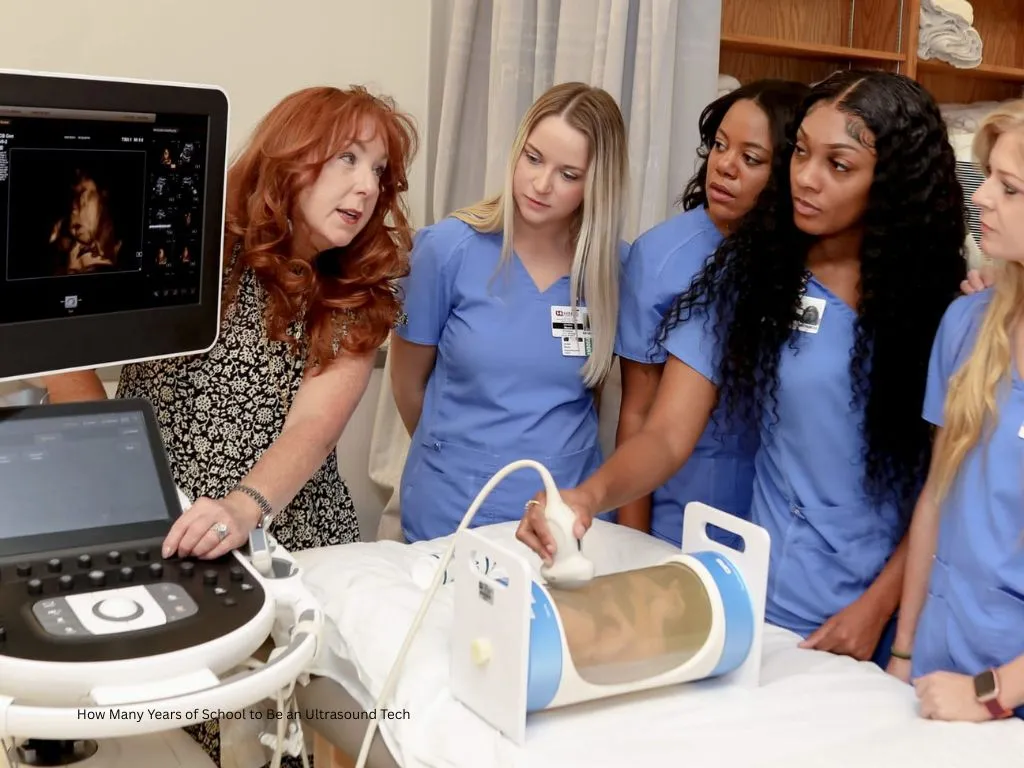How Many Years of School to Be an Ultrasound Tech? Everything You Need to Know

If you’re wondering how many years of school to be an ultrasound tech, the direct answer is you typically need 2 to 4 years of education, depending on the program you choose. An associate’s degree takes about 2 years, while a bachelor’s degree takes 4 years. However, there’s more to becoming an ultrasound technician than just school years, like clinical training, certification, and specialization.
This article explains every detail you need to know about schooling, certifications, career options, and more, so your journey to becoming an ultrasound tech starts with clarity.
Table of Contents
What Is an Ultrasound Tech and What Do They Do?
An ultrasound technician, also called a diagnostic medical sonographer, is a healthcare professional who uses special imaging equipment to create images of internal organs, tissues, and blood flow. These images are used by physicians to diagnose and monitor medical conditions.
Duties of an ultrasound tech include:
- Operating ultrasound machines
- Preparing patients for procedures
- Analyzing images
- Collaborating with doctors for accurate diagnosis
Ultrasound techs work in hospitals, clinics, private practices, and diagnostic labs. Some specialize in areas like obstetrics, cardiology, or musculoskeletal imaging.
Education Requirements: How Many Years of School to Be a Ultrasound Tech?
There are three main paths to become an ultrasound tech, and each path determines how many years of school you’ll need:
Associate Degree (2 Years) – Most Common Route
- Duration: About 2 years
- Offered by: Community colleges, vocational schools, and some universities
- Includes: Classroom coursework + clinical training
- Result: Eligible to sit for certification exams
This is the fastest and most popular path to enter the field, and it qualifies you for most entry-level positions.
Bachelor’s Degree (4 Years)
- Duration: 4 years
- Offered by: Universities and some colleges
- Includes: More advanced courses and broader health sciences background
- Ideal for: Career advancement, leadership roles, or future specialization
This path provides more career flexibility and may be required for certain advanced jobs.
Certificate Programs (1 to 1.5 Years)
- Duration: 12 to 18 months
- For: Students who already have a degree in a healthcare-related field
- Intense, hands-on training focused only on sonography
- Not always accepted by all employers—verify accreditation
These programs are great for career changers or healthcare professionals looking to add ultrasound to their skills.
Accreditation Matters: Choose the Right Program
When asking how many years of school to be a ultrasound tech, it’s important to also ask where to go. Make sure the program is accredited by recognized bodies such as:
- Commission on Accreditation of Allied Health Education Programs (CAAHEP)
- Joint Review Committee on Education in Diagnostic Medical Sonography (JRC-DMS)
Accreditation ensures that your education is legitimate and that you’ll qualify for national certification exams later.
Clinical Training: Hands-On Learning Is Essential
During your ultrasound tech education—whether it’s 2 or 4 years—you’ll complete clinical training in real healthcare settings. This hands-on experience is vital for:
- Practicing equipment use
- Learning patient care skills
- Gaining confidence before certification exams
Clinical rotations typically take place during the second year of associate or bachelor’s programs.
Certification and Licensing After School
Completing school is only the first step. Most employers require certification, even if not legally mandated in your state.
Main certifying bodies:
- American Registry for Diagnostic Medical Sonography (ARDMS)
- Cardiovascular Credentialing International (CCI)
- American Registry of Radiologic Technologists (ARRT)
To qualify, you must complete an accredited program and pass relevant exams. These certifications increase your employability and salary potential.
Specializations: Focused Roles for Better Careers
You can specialize during or after your education in fields like:
- Obstetric and gynecologic sonography
- Cardiac (echocardiography)
- Vascular sonography
- Abdominal sonography
Specialization can require additional schooling or certifications, often adding 6 months to 1 year depending on the program.
How Much Does It Cost to Become an Ultrasound Tech?
Tuition varies by program type and location:
- Associate degree: $5,000 to $20,000
- Bachelor’s degree: $20,000 to $60,000
- Certificate programs: $4,000 to $15,000
Additional costs may include:
- Books and lab fees
- Uniforms and supplies
- Certification exam fees ($200–$300)
Financial aid, scholarships, or employer-sponsored training may help cover costs.
Job Outlook and Salary Expectations
According to the U.S. Bureau of Labor Statistics (BLS):
- Job growth: Expected to grow 10% from 2021 to 2031 (much faster than average)
- Median annual salary: Around $81,350 (2022)
Your income may vary based on location, specialization, and experience. For example:
- OB/GYN ultrasound techs may earn more than general sonographers
- Urban hospitals often offer higher pay than rural clinics
Can You Work While Studying?
Yes, many students work part-time jobs, especially during their first year of school. Online and evening programs are available to support working students, though clinical rotations require in-person attendance.
Summary: Quick Answer Recap
So, how many years of school to be a ultrasound tech?
| Education Path | Duration | Best For |
|---|---|---|
| Associate Degree | 2 years | Most students |
| Bachelor’s Degree | 4 years | Career growth |
| Certificate Program | 1 to 1.5 years | Career changers |
In all cases, plan to add a few months for certification prep and exams.
Final Thoughts
Becoming an ultrasound tech is a rewarding, high-demand career path that starts with the right education. Depending on your goals, the journey can take anywhere from 1 to 4 years, but the outcome—a stable, high-paying healthcare job—is worth the investment.
Whether you’re just starting out or changing careers, understanding how many years of school to be a ultrasound tech is the first step. Now you’re equipped to choose the best path forward.






